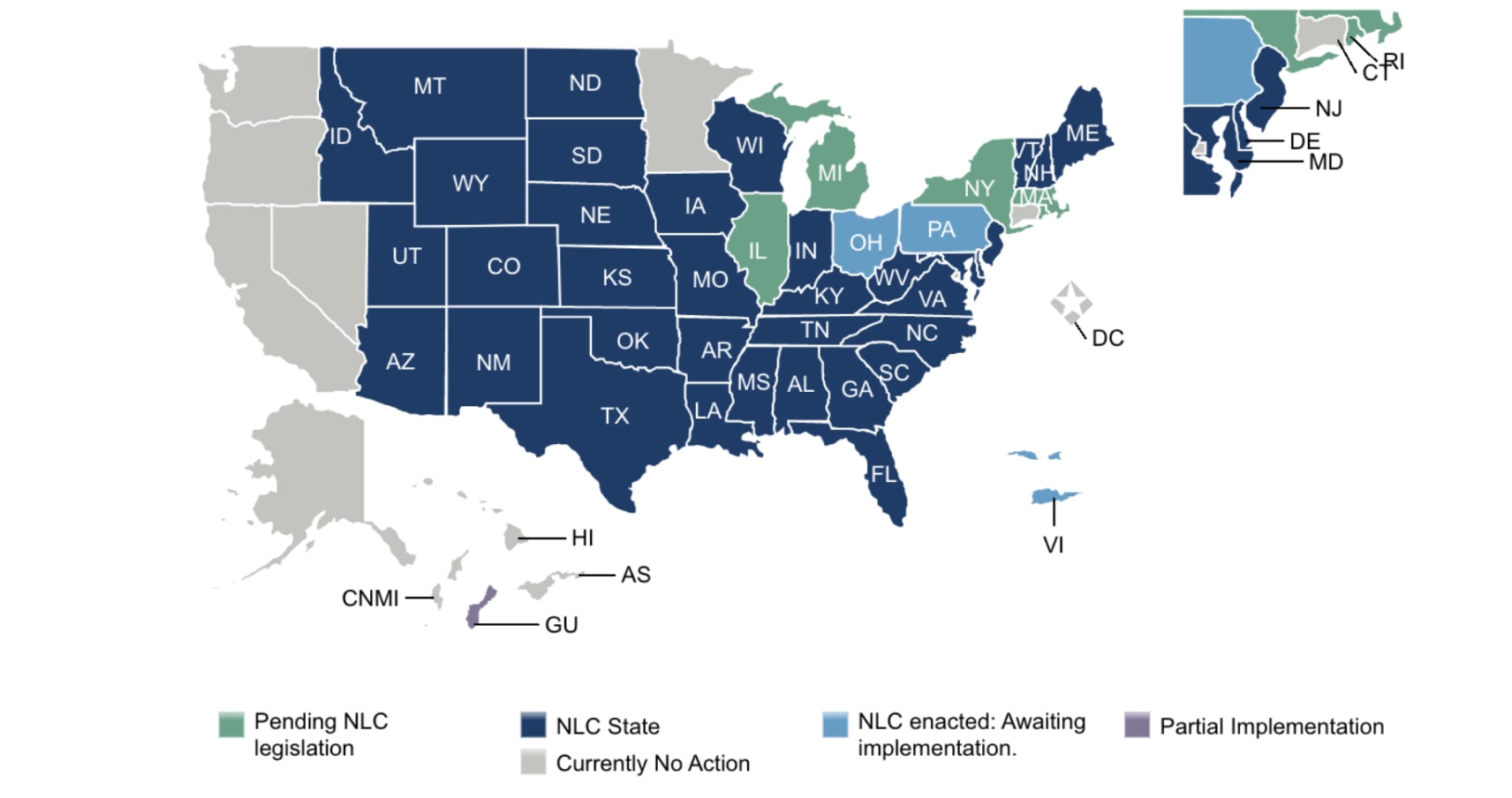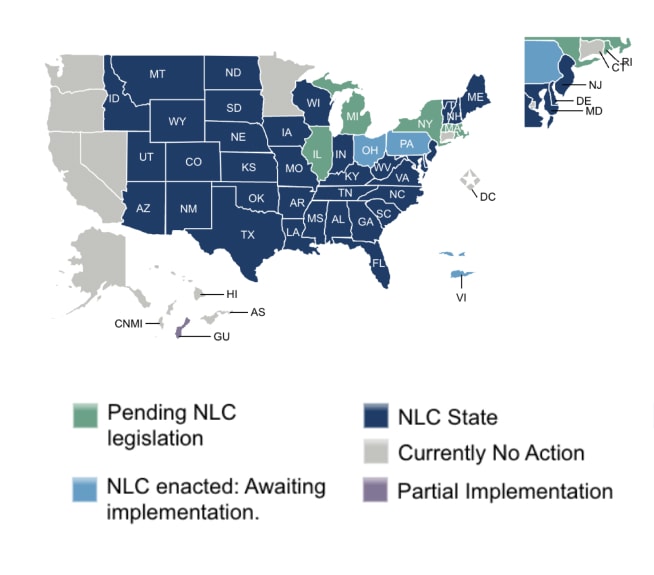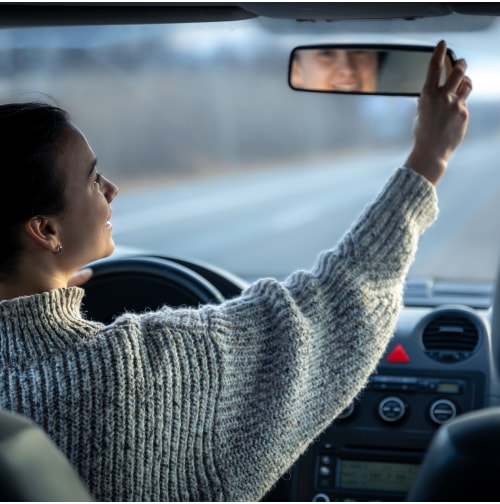Nursing Compact States


Compact States Benefits
The Enhanced Nurse Licensure Compact (eNLC) in the United States is an agreement among participating states that allows travel nurses, either registered nurses (RNs) and licensed traveling practical/vocational nurses (LPN/VNs), to have one multistate license, which enables them to practice in any of the compact states without having to obtain additional nursing licenses, renewal requirements and paying application fees.
The eNLC was developed to facilitate the mobility of nurses across state borders while maintaining public protection standards. Nurses who meet the requirements for a multistate license under the enhanced Nurse Licensure Compact must comply with the laws and regulations of each state where they practice.
This provides Registered Nurses with flexibility while saving time, money, and paperwork when taking travel assignments in any of the participating states.
The Nurse License Compact (NLC) started in 1997 and now, as of 2024, comprises 37 participating states and their boards of nursing, referred to presently as the Enhanced Nurse Licensure Compact (eNLC). In 2017, new legislation was adopted that now offers 11 uniform requirements allowing nurses to work in any one of these nursing compact states without having to obtain additional licenses.
Eligibility for Compact Nursing License
You may already be eligible for a Compact Nursing License if you legally reside in an eNLC state and you meet all the uniform licensure requirements. If not, registered nurses can obtain a compact license or multi-state license if they:
- Have graduated from a board-approved education program for nursing.
- Or a similar international education program approved by their nation’s accrediting body.
- Maintain an active nursing license.
- Complete state and federal fingerprint-based criminal background checks.
- No felony convictions in the past or misdemeanor convictions related to the practice of nursing.
- Have passed an NCLEX Nurse Examination.
- Meet residency state requirements for licensure.
- Maintain a valid United States Social Security number.
- Passed the English proficiency exam TOEFL.
- Are NOT participating currently in an alternative program.
How to Prove Your Primary State of Residence (PSOR) for the Compact License
To qualify for a multi-state license under the enhanced nursing licensure compact, you must prove your primary state of residence (PSOR). Your PSOR is the state where you declare your primary residence for legal purposes. This is a crucial step in becoming a multistate licensee. Verifying your legal residence or PSOR can be done through various sources such as a driver’s license, federal income tax return, or voter registration card. However, proof of property ownership does not qualify as proof of legal residence, so take that into consideration.
These documents serve as evidence of your legal residency status and help determine your eligibility for a multistate license.
It is important to note that upgrading from a single-state nursing license to a multistate license does not happen automatically. You must actively apply for the multistate license through the Board of Nursing (BON) website and meet the necessary requirements. Suppose your home state was part of the original Nursing Licensure Compact (NLC), and you previously held a multistate license. In that case, you may not need to pay an additional fee to transfer it to an enhanced Nursing Licensure Compact (eNLC) license. As long as you are eligible, a new compact license will be issued to you seamlessly.
You will, however, have to apply for a new license by endorsement in your new primary residence, although you have 60 days to do that, and the multi-state licensure from your previous state will be valid during that period.
Proving your primary state of residence is an essential step in qualifying for multistate licensure under the enhanced nursing licensure compact. By providing the required documentation and meeting the license eligibility criteria, you can obtain a multistate license that allows you to practice across state lines.
What If You Live in Non-Compact States
Nurses who live in a non-compact state will need to obtain a single-state license for each of the states in which they want to practice as a travel nurse.
You can have multiple state licenses at once without having to sacrifice a single-state license from your non-compact state of residence. Still, you won’t have the privilege of simply applying for licensure by endorsement in a compact state unless you move to an eNLC state. In which case, you need to apply for a multistate license in the new party state within 60 days as per the new nurse licensure compact (NLC) rule effective beginning January 2, 2024.
If your home state becomes a compact state, upgrading to a multistate license will not be automatic. You’ll have to apply for one.
How You Benefit from the enhanced Nurse Licensure Compact
A majority of states in the US are members of the eNLC, making travel in a compact state a snap.
As a licensed RN with an eNLC or multi-state license, you will have quick access to travel nursing jobs in other member states. There are currently 37 member states and the network continues to grow. Nurses who live in the original 25 compact states are grandfathered into the new eNLC.
Your Stability recruiter will be happy to talk you through the licensing process. In the end, you’ll have a multi-state nursing license that saves you a great deal of time, money, and paperwork and allows you to do what you love in 37 states!
Explore the Compact States
- Alaska
- Arizona
- Arkansas
- Colorado
- Delaware
- Florida
- Georgia
- Idaho
- Indiana
- Iowa
- Kansas
- Kentucky
- Louisiana
- Maine
- Maryland
- Mississippi
- Missouri
- Montana
- Nebraska
- New Hampshire
- New Jersey
- New Mexico
- North Carolina
- North Dakota
- Oklahoma
- South Carolina
- South Dakota
- Tennessee
- Texas
- Utah
- Virginia
- West Virginia
- Wisconsin
- Wyoming





